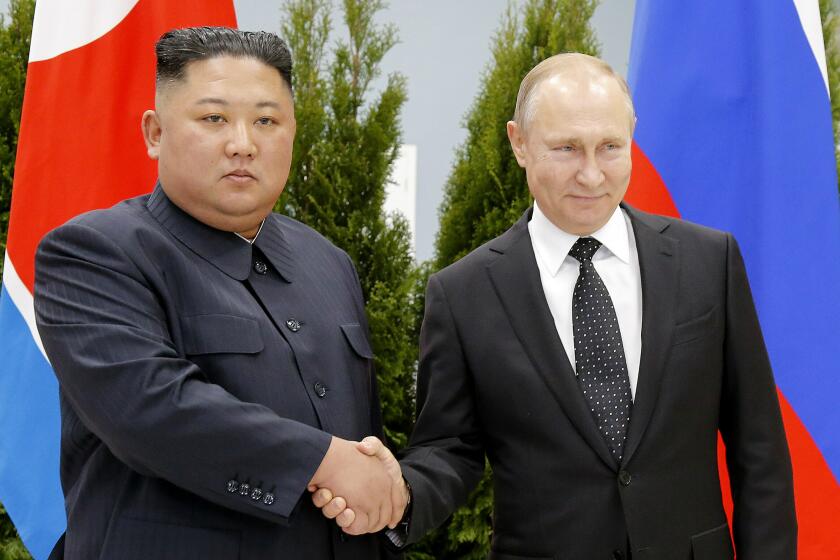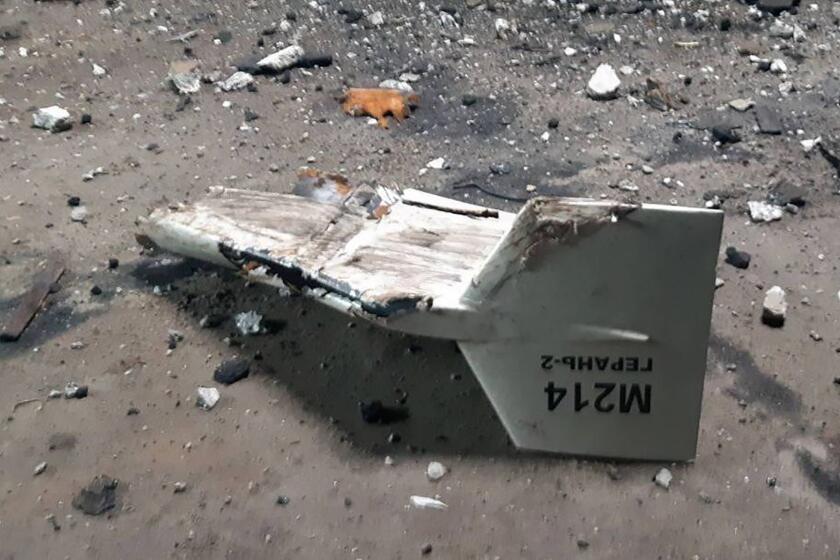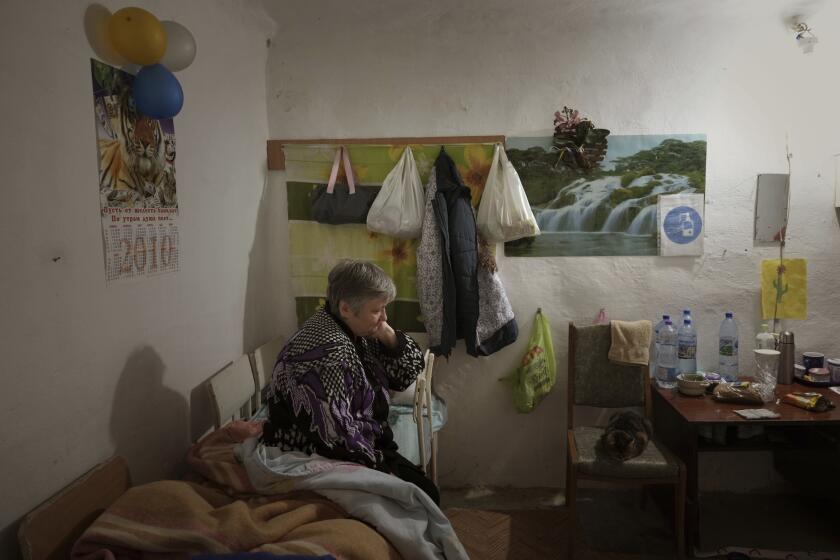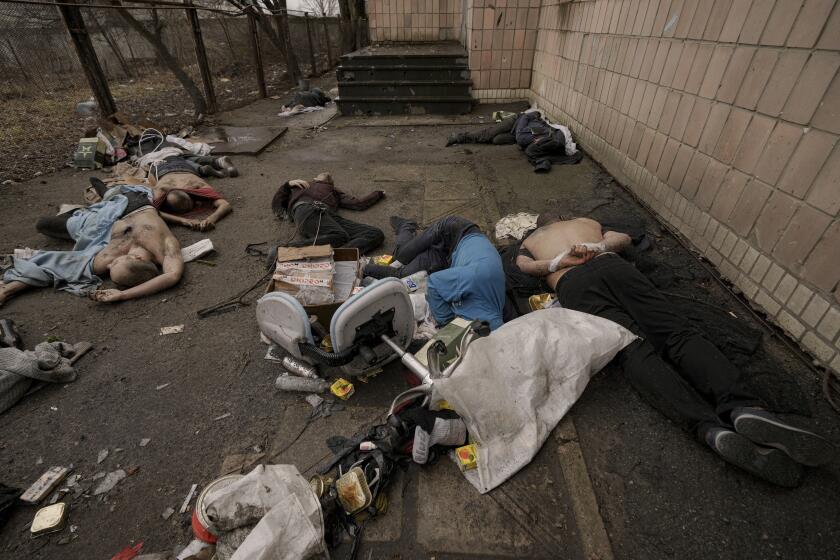Zelensky says peace talks with Russia are possible, but on Ukraine’s terms
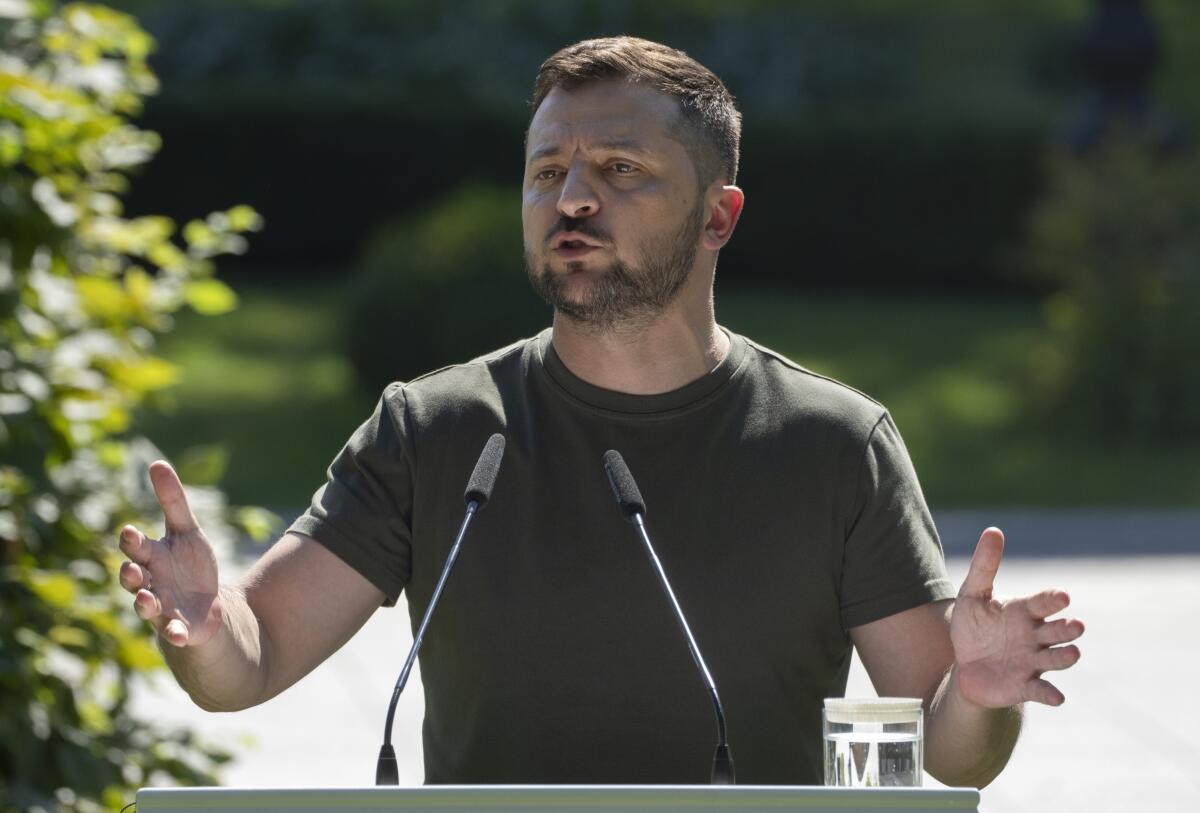
- Share via
KYIV, Ukraine — Ukraine’s president has suggested he’s open to peace talks with Russia, softening his earlier refusal to negotiate with Moscow while President Vladimir Putin is in power but sticking to Kyiv’s preconditions.
Volodymyr Zelensky’s appeal to the international community late Monday to “force Russia into real peace talks” reflected a change in rhetoric for a leader who signed a decree in late September stating “the impossibility of holding talks” with Putin. But since his preconditions appear to be nonstarters for Moscow, it’s hard to see how Zelensky’s latest comments would pave the way for any talks.
Zelensky reiterated that his conditions for dialogue were the return of all of Ukraine’s occupied lands, compensation for damage caused by the war and the prosecution of war crimes.
Western weapons and aid have been key to Ukraine’s ability to fight Russia’s invasion, which some initially expected would tear through the country with relative ease. But U.S. midterm elections Tuesday will define the amount and the shape of Washington’s future political and financial support for Ukraine.
While that support has garnered strong bipartisan support in Congress, a growing conservative opposition could complicate that next year if Republicans take control of the House.
Recent comments from Republican Minority Leader Kevin McCarthy (R-Bakersfield), saying lawmakers would not cut a “blank check” to Ukraine, reflect the party’s growing skepticism about the cost of support for Kyiv.
In private, Republican lawmakers who support aid to Ukraine say there could be an opportunity to pass one more tranche of assistance this year with the current Congress.
Russia and Ukraine held several rounds of talks in Belarus and Turkey early on in the war, which is now nearing its nine-month mark. The talks stalled after the last meeting of the delegations in Istanbul in March yielded no results.
North Korea denied U.S. allegations that it is shipping artillery shells and ammunition to Russia for use in its war against Ukraine.
Zelensky said Monday that Kyiv has “repeatedly proposed [talks] and to which we always received crazy Russian responses with new terrorist attacks, shelling or blackmail.”
But he has more recently refused to negotiate with Putin — itself a change of stance after he repeatedly called for a personal meeting with the Russian leader. The Kremlin brushed off any such meeting.
Zelensky listed conditions for the dialogue to begin, including the “restoration of [Ukraine’s] territorial integrity ... compensation for all war damage, punishment for every war criminal and guarantees that it will not happen again.”
Russia, meanwhile, resumed calls for talks after Ukraine’s successful counteroffensive in the east and the south of the country began in September, but Ukraine has been rejecting the possibility.
Iran’s foreign minister says his country has supplied Russia with drones but insists that the transfer came before Moscow’s war on Ukraine.
Russia’s deputy foreign minister, Andrei Rudenko, stressed Tuesday that Moscow was not setting any conditions for the resumption of talks with Ukraine and accused Kyiv of lacking “goodwill.”
“This is their choice. We have always declared our readiness for such negotiations,” Rudenko said.
Zelensky advisor Mykhailo Podolyak insisted in a tweet Monday that “Ukraine has never refused to negotiate” but that Russia first had to withdraw its troops from the country. “Is Putin ready? Obviously not,” Podolyak wrote.
Meanwhile, in the eastern Donetsk region, which the Russians are struggling to take full control of, Russian shelling killed three civilians and wounded seven others over the last 24 hours, according to Donetsk Gov. Pavlo Kyrylenko.
Many Ukrainians no longer ask if their country will be hit by nuclear weapons — they are actively preparing for that once-unthinkable possibility.
Kyrylenko said the deaths occurred in the city of Bakhmut, a key target of Russia’s grinding offensive in Donetsk, and the town of Krasnohorivka. Ukraine’s deputy defense minister last week described the Bakhmut area as “the epicenter” of fighting in eastern Ukraine.
Elsewhere, two civilians were seriously wounded by unexploded mines in Ukraine’s northeastern Kharkiv region, where Kyiv’s forces retook broad swaths of territory in September, Kharkiv Gov. Oleh Sinegubov said.
In the partially occupied Kherson region in the south, where Ukraine’s troops are conducting a counteroffensive, Russian-installed authorities said they had “completed” measures to evacuate residents ahead of anticipated Ukrainian advances.
The Kremlin-appointed administration had sought to relocate tens of thousands of people in anticipation of a Ukrainian advance deeper into the region. Ukrainian military and civilian officials have previously described the relocation measures as “forced displacement.”
It was a cold, gray morning, March 4 in Bucha, Ukraine, when Russian soldiers embarked on a cleansing operation.
Kirill Stremousov, deputy head of the Kremlin-backed administration, has repeatedly denied that.
Russian-backed officials in Kherson announced that motorized ferries transporting civilians across the Dnieper River and deeper into Russian-held territory were no longer running. According to the announcement, made Monday on Telegram, the main remaining relocation route is across the Antonivskiy Bridge over the Dnieper, which has been repeatedly damaged by Ukrainian attacks and is now operated by the Russian military.
On a visit to Kyiv, the U.S. ambassador to the United Nations reassured Ukrainian farmers that extending a wartime deal that allows Ukrainian grain and other commodities to be shipped on the Black Sea was a priority for the U.N. The agreement is set to expire Nov. 19.
“I am here seeing Ukraine as the breadbasket of the world. ... This [war] really has had an impact on the entire global food market,” Ambassador Linda Thomas-Greenfield said while speaking to farmers and reporters at a grain storage facility in the Ukrainian capital.
Brokered by the U.N. and Turkey, the shipping initiative has allowed more than 9 million tons of grain in 397 vessels to leave Ukrainian ports and travel along a designated corridor. Russia briefly suspended its participation in the deal last week, alleging that a Ukrainian drone had attacked its Black Sea fleet in Crimea on Oct. 29.
More to Read
Sign up for Essential California
The most important California stories and recommendations in your inbox every morning.
You may occasionally receive promotional content from the Los Angeles Times.
